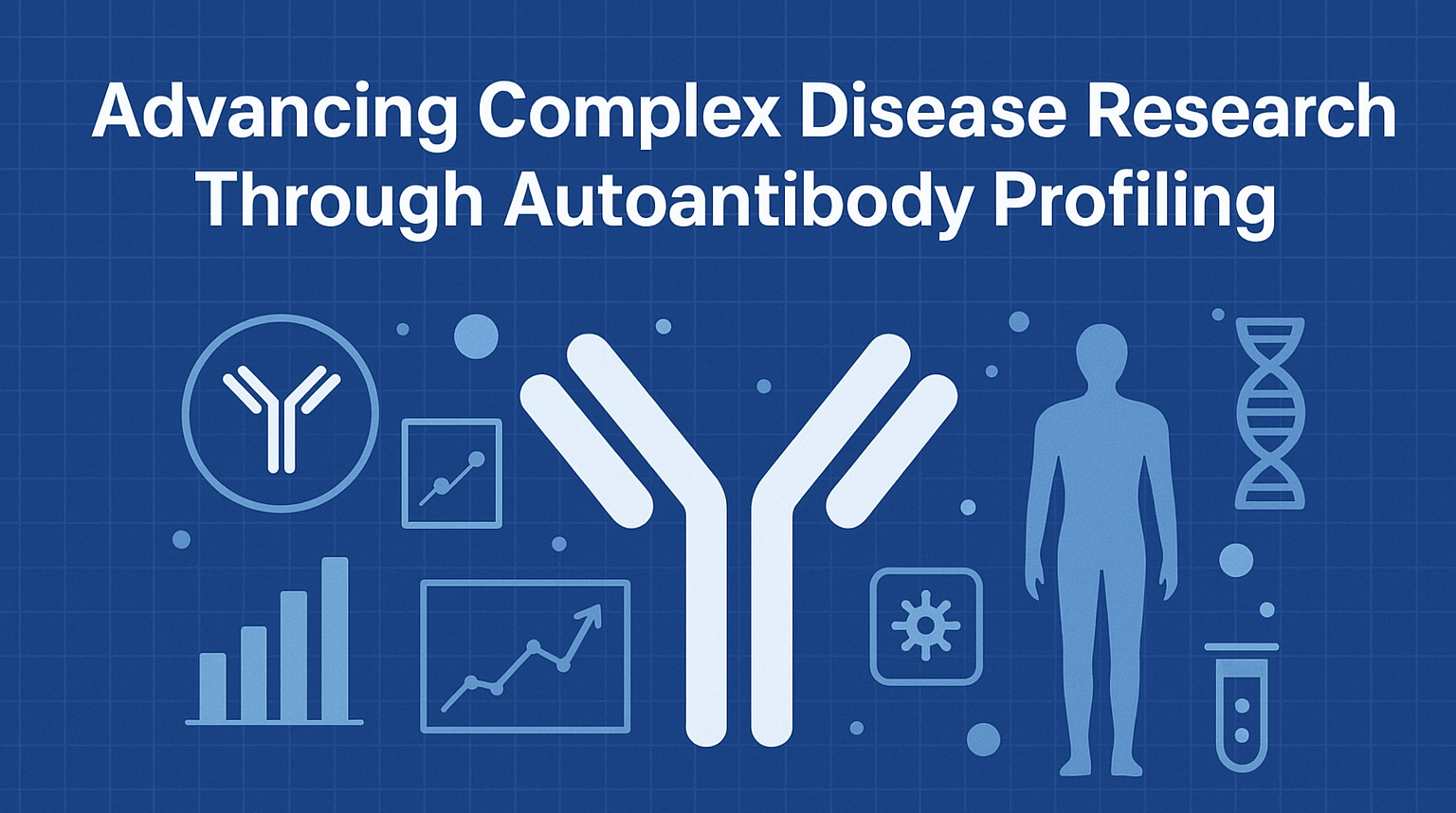Welcome to our latest newsletter, where we explore groundbreaking advancements in disease research. This issue focuses on autoantibody profiling, an emerging area that is reshaping our understanding of the biology of complex diseases.
What are Autoantibodies?
Autoantibodies are immune system proteins that mistakenly target the body’s own tissues. While traditionally associated with autoimmune diseases, their presence in patients with complex diseases offers a promising window into disease biology research. Autoantibodies may be pathogenic, disease-specific and diagnostic, or of no apparent significance. Because autoantibodies can develop early in disease, it makes them potential biomarkers for early detection of diseases such as cancer.
The Role of Autoantibody Profiling in Research
1. Early Detection and Diagnosis: Studies show that tumor-associated antigens (TAAs) trigger the production of autoantibodies, even before clinical symptoms ap-pear (Trends Cancer, 2017 Mar;3(3):198 198-213. doi: 10.1016/j.trecan.2017.02.003). Studies also show that autoantibody panels can detect cancers such as lung, breast, and ovarian at earlier stages compared to traditional methods.
2. Prognostic Biomarkers: Autoantibody profiles can provide insight into disease progression and patient outcomes. For example, distinct patterns of autoantibodies have been associated with better survival rates in melanoma and breast cancer patients (Biosensors and Bioelectronics, Volume 139, 15 August 2019, 111315).
3. Therapeutic Targets: Identifying tumor-specific autoantibodies can reveal novel therapeutic targets. For instance, researchers are exploring autoantibodies as a means to track immune responses to immunotherapy and tailor treatments.
4. Personalized Medicine: By analyzing autoantibody signatures, clinicians can predict patient responses to specific treatments, paving the way for personalized therapies (Front Immunol.2022 Oct 19;13:953726.doi: 10.3389/fimmu.2022.953726).
Recent Advances in Autoantibody Research
a) Proteomic platforms, such as protein microarrays and antigen arrays (itsibio.com/product/autoantibody-detection-kit-k-0046/) are revolutionizing autoantibody detection. These tools allow researchers to analyze multiple autoantibodies simultaneously, improving sensitivity and specificity.
b) Artificial intelligence is playing a crucial role in identifying patterns within autoantibody data. Predictive models built on machine learning are improving the accuracy of disease diagnostics.
c) A study demonstrated a panel of autoantibodies with 92% specificity in detecting early-stage non-small cell lung cancer (Thorax,2008 Mar; 63(3):228-33. doi: 10.1136/).
Ongoing trials are evaluating autoantibody-based blood tests as part of routine cancer screenings.
Challenges and Future Directions
Despite its promise, several challenges remain, such as standardization, elucidating the biology and performing clinical validation.
a) Standardization: Variability in assay platforms and sample handling can hinder reproducibility.
b) Biological Complexity: Autoantibody responses vary between patients, cancers, and disease stages.
c) Clinical Validation: Large-scale clinical trials are needed to validate autoantibody biomarkers for widespread use.
Looking Ahead
Integrating autoantibody profiling with other omics data, such as genomics and metabolomics, could provide a holistic view of complex disease biology. Collaborative efforts between academia, industry, and clinical settings will be crucial for translating these promising discoveries into actionable solutions.
Spotlight: A Case Study
A study that utilized an antigen array to screen human plasma samples from a test (cancer) and control (no cancer) group, detected 29 autoantibodies (Cancer Genomics & Proteomics 13: 13-20; 2016). Out of the antibodies detect-ed, the autoantibody against osteoprotegerin was significantly higher in the “test” group (p<0.001) while those against macrophage migration inhibitor factor, interleukin-2 and vascular endothelial growth factor were lower (p<0.05) in the test group.
Opportunities for Collaboration
Organizations such as ITSI-Biosciences (www.itsibio.com) offer products for autoantibody profiling, and can also provide autoantibody screening services. Visit their websites to take advantage of their expertise.
Are you working on autoantibody research or seeking expertise in biomarker discovery? Let’s connect! Our team is eager to collaborate on advancing autoantibody profiling in complex disease research.
Download the full article here
The purpose is to provide information about available tools and services for Lifescience research. For questions/comments please send an email to Editor, ITSIBio News, itsi@itsibio.com.


